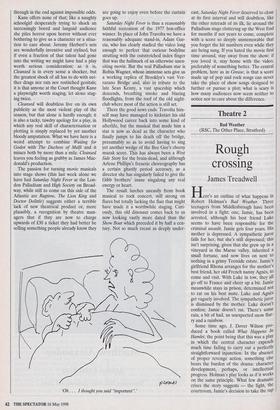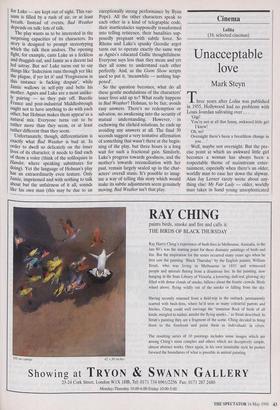Theatre 2
Bad Weather (RSC, The Other Place, Stratford)
Rough crossing
James Treadwell
Here's an outline of what happens in Robert Holman's Bad Weather. Three teenagers from Middlesbrough have been involved in a fight; one, Jamie, has been arrested, although his best friend Luke seems to have been responsible for the criminal assault. Jamie gets four years. His mother is depressed. A sympathetic juror falls for her, but she's still depressed; this isn't surprising, given that she grew up in a vineyard in the Marne valley, inherited a small fortune, and now lives on next to nothing in a grimy Teesside estate. Jamie's girlfriend Rhona arranges for the mother's best friend, her old French nanny Agnes, to come and visit. With Luke in tow, they all go off to France and cheer up a bit. Jamie meanwhile stays in prison, determined not to rat on his best mate. Luke and Agues get vaguely involved. The sympathetic juror is dismissed by the mother. Luke doesn't confess; Jamie doesn't rat. There's some rain, a bit of hail, an unexpected snow flur- ry and a rainbow.
Some time ago, J. Dover Wilson pro- duced a book called What Happens In Hamlet, the point being that this was a play in which the central character expends much time failing to carry out a perfectly straightforward injunction. In the absence of proper revenge action, something else bears the burden of the drama: character development, perhaps, or intellectual progress. Holman's play looks as if it works on the same principle. What few dramatic crises the story suggests — the fight, the courtroom, Jamie's decision to take the rap for Luke — are kept out of sight. This vac- uum is filled by a rush of air, or at least breath. Instead of events, Bad Weather depends on talk: lots of talk.
The play wants us to be interested in the surprising capacities of its characters. Its story is designed to prompt stereotyping which the talk then undoes. The opening fight, for example, casts Luke as a feckless and thuggish oaf, and Jamie as a decent lad led astray. But no! Luke turns out to say things like 'Indecision runs through yer like the plague, if yer let it' and 'Forgiveness in this instance is fucking despair', while Jamie wallows in self-pity and belts his mother. Agnes and Luke are a most unlike- ly pairing — so they pair off. Bucolic France and post-industrial Middlesbrough ought not to have anything to do with each other, but Holman makes them appear' as a natural mix. Everyone turns out to be rather more than they seem, or at least rather different than they seem. Unfortunately, though, differentiation is exactly what Bad Weather is bad at. In order to dwell so delicately on the inner lives of its character, it needs to find each of them a voice (think of the soliloquies in Hamlet, where speaking substitutes for doing). Yet the language of Holman's play has an extraordinarily even texture. Only Jamie, imprisoned and with nothing to talk about but the unfairness of it all, sounds like his own man (this may be due to an exceptionally strong performance by Ryan Pope). All the other characters speak to each other in a kind of telegraphic code, their inarticulacies supposedly transformed into telling reticence, their banalities sup- posedly pregnant with subtle force. So Rhona and Luke's spunky Geordie argot turns out to operate exactly the same way as Agnes's educated Gallic thoughtfulness. Everyone says less than they mean and yet they all come to understand each other perfectly. And, as the Goon Show scripts used to put it, 'meanwhile — nothing hap- pened'.
So the question becomes, what do all these gentle modulations of the characters' inner lives add up to? What really happens in Bad Weather? Holman, to be fair, avoids easy answers. There's no redemption or salvation, no awakening into the security of mutual understanding. However, in eschewing the cliched solutions, he ends up avoiding any answers at all. The final 30 seconds suggest a very tentative affirmation of something that wasn't there at the begin- ning of the play, but three hours is a long wait for such a fractional gain. Similarly, Luke's progress towards goodness, and the mother's towards reconciliation with her past, remain largely sealed up in the char- acters' overall stasis. It's possible to imag- ine a way of telling this story which would make its subtle adjustments seem genuinely moving. Bad Weather isn't that play.



























































 Previous page
Previous page